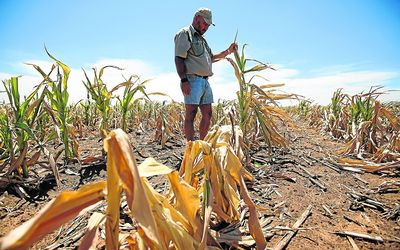Farm yields cut by half in parched Swartland
by Troye Lund,
2015-11-06 05:30:23.0
AS THE strongest El Nino in two decades continues to grip parts of the country, Western Cape dam levels have plunged 18% since this time last year.
A drought and disaster have not yet been officially declared in the province, but it looks like it will be only a matter of time.
Western Cape MEC for economic opportunities Alan Winde is monitoring the effect of the weather conditions on farmers, especially those in the Swartland, where dry-land wheat farmers rely on winter rains to sustain their crops.
A dry 2014-15 summer followed by lower-than-expected winter rainfall have resulted in Swartland farm yields being cut by half.
Disappointing winter rains, which normally replenish dams, have not made things easy for farmers.
Agri Western Cape’s Carl Opperman said: "Everything right of the N1 (wheat and agronomy crops) has had more rain and those harvests are not looking bad. The farmers on the left of the N1 have been hardest hit and they are sitting with massive production debts. They will also have to find a way to finance their next crop."
Record temperatures have been documented in parts of the Western Cape. In Vredendal, in the northern part of the Boland, temperatures soared to a record 48.4°C last Friday.
Provinces do not have contingency funding for disaster relief. The national government releases funds when provinces declare a disaster.

BARREN: Paul van der Walt examines the failed maize crop on his drought-hit farm. Picture: SUNDAY TIMES
AS THE strongest El Nino in two decades continues to grip parts of the country, Western Cape dam levels have plunged 18% since this time last year.
A drought and disaster have not yet been officially declared in the province, but it looks like it will be only a matter of time.
Western Cape MEC for economic opportunities Alan Winde is monitoring the effect of the weather conditions on farmers, especially those in the Swartland, where dry-land wheat farmers rely on winter rains to sustain their crops.
A dry 2014-15 summer followed by lower-than-expected winter rainfall have resulted in Swartland farm yields being cut by half.
Disappointing winter rains, which normally replenish dams, have not made things easy for farmers.
Agri Western Cape’s Carl Opperman said: "Everything right of the N1 (wheat and agronomy crops) has had more rain and those harvests are not looking bad. The farmers on the left of the N1 have been hardest hit and they are sitting with massive production debts. They will also have to find a way to finance their next crop."
Record temperatures have been documented in parts of the Western Cape. In Vredendal, in the northern part of the Boland, temperatures soared to a record 48.4°C last Friday.
Provinces do not have contingency funding for disaster relief. The national government releases funds when provinces declare a disaster.





















Change: -2.05%
Change: -2.09%
Change: -1.71%
Change: -1.64%
Change: -5.74%
Data supplied by Profile Data
Change: 0.00%
Change: 0.00%
Change: -2.05%
Change: 0.00%
Change: 0.00%
Data supplied by Profile Data
Change: 0.07%
Change: -0.16%
Change: 0.19%
Change: -0.35%
Change: -0.40%
Data supplied by Profile Data
Change: 0.00%
Change: 0.00%
Change: 0.00%
Change: 0.00%
Change: 0.00%
Data supplied by Profile Data